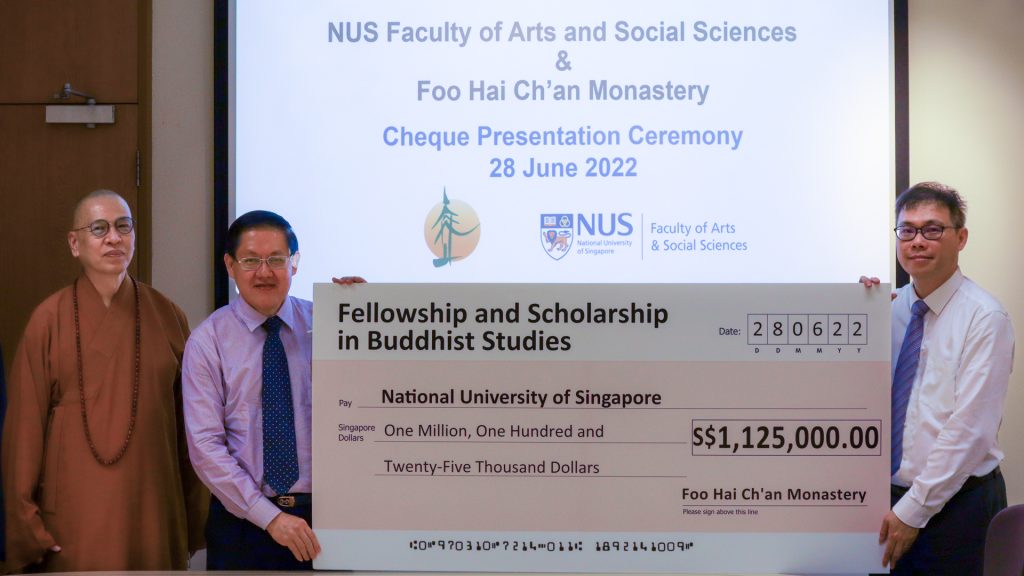Buddhist Studies Scholarships and Fellowships Established with Gift from Foo Hai Ch’an Monastery
July 1, 2022
IN BRIEF | 10 min read
- The Foo Hai Ch’an Monastery's gift of S$1,125,000 will be used to award scholarships to deserving FASS graduate research candidates who focus on Buddhist Studies.
- Each scholarship will be tenable for up to two years for Master’s candidates and up to four years for PhD candidates. The first round of scholarships and the fellowships will be rolled out in August 2023.

The Foo Hai Ch’an Monastery has made a gift of S$1,125,000 to support scholarships and fellowships in Buddhist Studies at the NUS Faculty of Arts and Social Sciences (FASS).
The gift will be used to award scholarships to deserving FASS graduate research candidates who focus on Buddhist Studies. Each scholarship will be tenable for up to two years for Master’s candidates and up to four years for PhD candidates.
It will also be used to support fellowships—the first to be established for the discipline in Singapore— for academics to undertake research on and teach modules in Buddhist Studies. They will also be encouraged to develop new modules in the discipline. The gift may also be used to support NUS FASS undergraduate or graduate students who pursue research on topics in Buddhist history or studies, such as the funding of student research trips to archives overseas or the presentation of scholarly papers at international conferences.
“Foo Hai Ch’an Monastery had donated S$200,000 to establish the Foo Hai Ch’an Monastery Bursary last year, and we wanted to continue to see how we could support NUS. We are glad to work together with NUS to further Buddhist Studies, and to support the endowed fund for fellowships in Buddhist Studies as well as the endowed fund for graduate scholarships in Buddhist Studies,” said Venerable Ming Yi, Abbot of Foo Hai Ch’an Monastery.
The cheque was presented by Venerable Ming Yi and Dr Aaron See, Chairman of Foo Hai Ch’an Monastery, to Associate Professor Loy Hui Chieh, FASS Vice-Dean of External Relations and Student Life, in a simple ceremony held at FASS on 28 June.
Assoc Prof Loy Hui Chieh said, “The strengthening of our existing scholarship in Buddhist studies and creation of an academic position in this area will enable NUS to attract strong scholars in humanities and social sciences to foster scholarship and encourage research in Buddhist Studies in Singapore.”
The scholarly importance of Buddhism has seen many top universities, including Columbia University, the University of Oxford, Stanford University, the University of California, Berkeley, and the University of Michigan, establishing scholarships and academic centres, as well as professorships and fellowships, devoted to Buddhist studies.
“Perhaps unknown to many Singaporeans, the Buddhist Studies programme taught in many leading universities around the world is a secular interdisciplinary programme dedicated to both the academic study and the public understanding of Buddhist traditions,” observed Dr Jack Chia, Assistant Professor of History and Religious Studies at the Department of History at NUS FASS.
“Students of Buddhist Studies are taught critical analysis and scholarly research of various aspects of Buddhism, such as art, history, philosophy, psychology and sociology. This gift from Foo Hai Ch’an Monastery is a major step in establishing Buddhist Studies at NUS,” he added.
Foo Hai Ch’an Monastery was founded in 1935 by Taiwan-born Japan-ordained Venerable Hong Zong who came to popularise Buddhism in Singapore. Over the years, Foo Hai Ch’an has been actively involved in the areas of education, charity and culture. In education, the Monastery conducts activities such as Buddhist Studies classes and lectures, and the award of scholarships and grants to primary and secondary schools. In the field of charity, a group of volunteers are responsible for helping families in need, through organising regular visits and the distribution of food supplies and essentials.
The first round of scholarships and the fellowships will be rolled out in August 2023.
This article first appeared in NUSNews on 30 June 2022.

